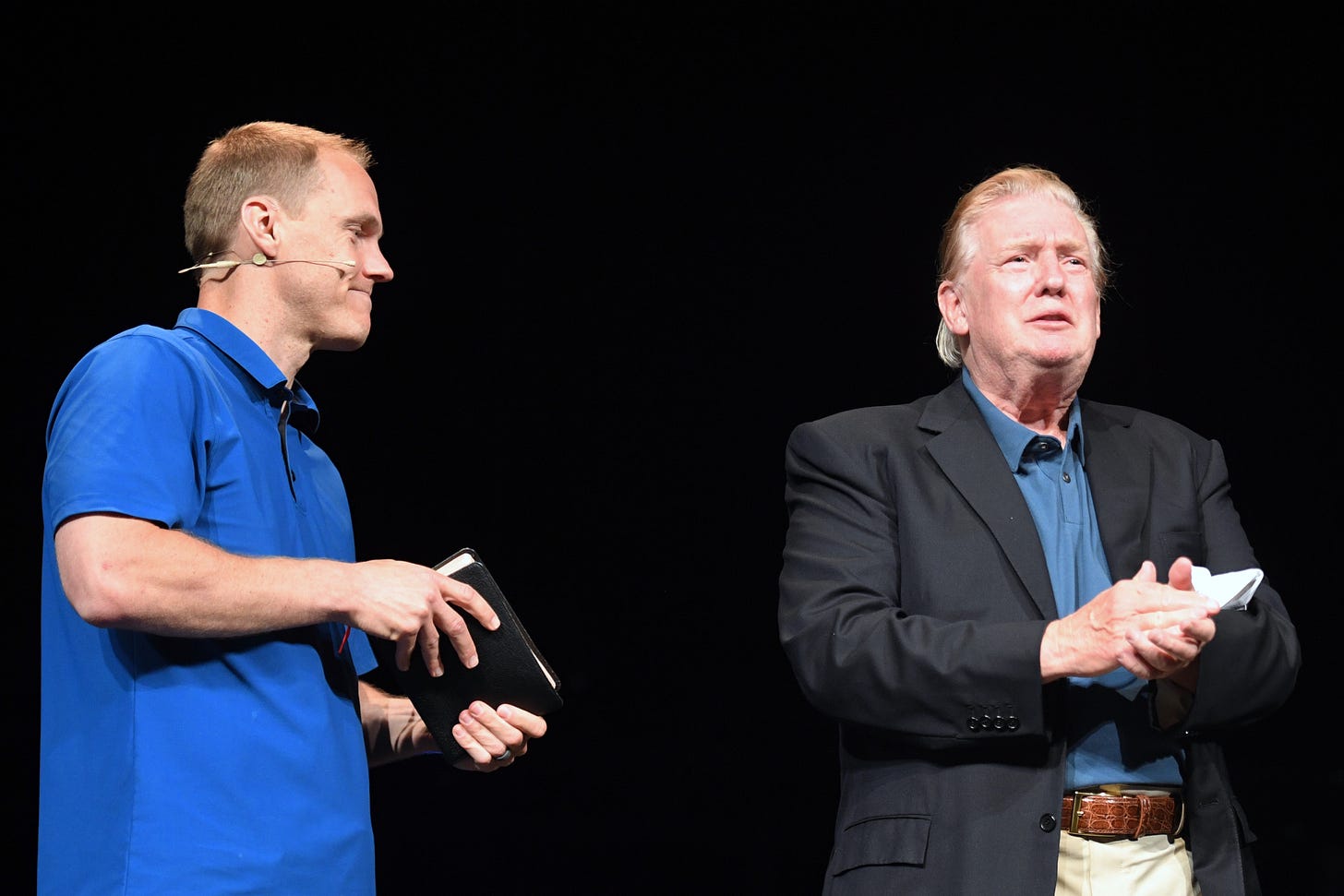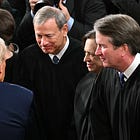Goodbye, separation of church and state
Churches now have extra special speech rights, thanks to Trump.

🗣️ Paid subscribers make Public Notice possible. If you appreciate our fiercely independent coverage of American politics, please sign up and support us. 👇
The Trump administration last week handed a huge win to conservative Christians who’ve been agitating for churches to be able to endorse political candidates without endangering their tax-exempt status.
If you’ve ever heard your right-wing uncle muttering darkly about the Johnson Amendment, he’s probably a big fan of this move. Named after Lyndon B. Johnson, who introduced it in the Senate, the 1954 law is part of 26 U.S.C. 501(c)(3) of the United States tax code. To be tax-exempt under that section, churches and nonprofits cannot “participate in, or intervene in (including the publishing or distributing of statements), any political campaign on behalf of (or in opposition to) any candidate for public office.”
The Johnson Amendment is not exactly a difficult law to parse. To keep that sweet tax-exempt status, groups can’t endorse political candidates. But evangelicals want to have their cake and eat it too. They don’t want to pay taxes, but they do want ministers to be able to climb into the pulpit and tell their flock who to vote for.
The Alliance Defending Freedom, the hard-right law firm with a truly staggering track record of getting the United States Supreme Court to validate their bigoted theocratic positions, has been urging pastors to just defy the law since 2008. But thanks to the Trump administration, they’ll no longer have to.
An insult to nonsense
During his aggressive courting of the evangelical vote during the 2016 election, Trump promised to repeal the Johnson Amendment. The topsy-turvy argument conservatives make as to why they shouldn’t have to follow the law is that stopping pastors from overtly partisan political campaigning is a violation of their First Amendment rights of free speech and freedom of religion.
For a moment, just take that argument as valid, even though it flies in the face of the whole separation of church and state thing. It’s still the case that no one is telling churches they cannot endorse political candidates until they are blue in the face. The government has placed no restrictions at all on their speech. The only consequence churches face, like all other nonprofits, is that they have to pay taxes if they want to be partisan political actors.
Luckily for those churches, however, both the president and the conservative supermajority on the Supreme Court are 100 percent on board with making sure right-wing Christians get whatever they want.
As a bonus, conservative Christians also have a Congress that’s happy to cede its power to Trump, which is why the Republican majorities don’t seem to care that he just wiped away part of the tax code. Despite the fact that only Congress has the power to repeal or amend laws, Trump didn’t even bother with an executive order on this one, instead announcing the major change in a court filing settling a 2024 lawsuit brought by the National Religious Broadcasters and other religious plaintiffs. Those plaintiffs wanted the Johnson Amendment declared unconstitutional, asserting it isn’t fair that nonprofits organized under 501(c)(3) can’t endorse candidates because other nonprofits that fall under different parts of the tax code get to.
It doesn’t take a big lawyer brain to see that an argument about different types of organizations getting treated differently under different laws is not exactly evidence of a nefarious plot to suppress religious beliefs. If 501(c)(3) prohibited churches from partisan politicking but let other nonprofits do so, that could be a constitutional violation — but it doesn’t.
Well, it didn’t until this court filing from the Trump administration. Now, churches can endorse political candidates and not lose their tax-exempt status, but secular nonprofits cannot. The First Amendment does not stand for the proposition that religious groups get extra-special treatment from the government. Indeed, the historical understanding of the First Amendment is quite the opposite — that government should not be entangled with religion.
A note from Aaron: Enjoying this article from Lisa? Then please sign up to support our work 📈 Paid subscribers keep PN free for everyone 📈
The National Religious Broadcasters lawsuit gave the Trump administration a terrific opportunity to throw out the Johnson Amendment. Rather than going to court to enforce the existing laws of the United States, which is what the Department of Justice is supposed to do, the DOJ cut a sweetheart deal with the plaintiffs to give them everything they wanted and more.
The plaintiffs had asked that the whole of the Johnson Amendment be tossed so that all 501(c)(3) nonprofits would be free to endorse candidates. Instead, the consent judgment between the plaintiffs and the Internal Revenue Service applies only to churches. So now religious groups get a benefit that secular nonprofits don’t, which is pretty much the exact opposite of the First Amendment.
The way that the IRS got to this carveout is exceedingly not great, because it relies on treating churches as somehow more special than other types of nonprofits, saying that when a pastor endorses someone from the pulpit, they are not participating or intervening in electoral politics. Rather, political endorsements by a church, communicated to the congregation during religious services, are the same as a “family discussion” about candidates and therefore don’t violate the Johnson Amendment.
To say this distinction is nonsense would be an insult to nonsense. There’s no logical or legal reason that a pastor telling a congregation who to vote for is different than the executive director of a secular nonprofit telling people who to vote for. But here we are, and both the plaintiffs and the Trump administration know there’s no danger the Supreme Court or Congress will rouse themselves from slumber and address this.
There is no right to not pay taxes
The religious plaintiffs filed their case in the Eastern District of Texas, Tyler Division, where they were guaranteed to draw one of two Trump appointees.
They got Judge J. Campbell Barker, who was very concerned about overreach back when Joe Biden was president. Last year, Barker struck down an executive order that would have allowed some undocumented spouses to apply for a green card. Doing so, said Barker, stretched the immigration law “past its breaking point.”
Huh. So surely when the executive branch decides a random court filing is the mechanism to wipe away the decades-long interpretation of a statute and substitute its own, Campbell would be concerned that such a move would stretch the tax code “past its breaking point.”
Lol, nope. Campbell signed off on the consent judgment just a day after it was filed.
To be fair to Campbell, it’s pretty likely that if this got litigated all the way up to the Supreme Court, the result would be exactly the same. The conservative majority has already ruled that conservative Christians can refuse to work with same-sex couples and that a public high school coach conducting large, ostentatious Christian prayer services on the 50-yard-line after football games somehow doesn’t violate the First Amendment. They’ve also steadily decimated the separation of church and state, twisting themselves in knots to rule that the First Amendment actually requires taxpayer dollars to go to religious schools. Just last term, they held that the mere act of having LGBTQ-positive books in a school curriculum was “hostile” to parents with conservative religious views and schools must have an opt-out policy. In short, the Court’s conservatives would likely have been hyped to make a special exception for churches, because they always are.
Nonprofits that are not churches are not clamoring to be allowed to engage in partisan political speech. Indeed, the Council of Nonprofits raised the alarm about the consent judgment, explaining that getting rid of the Johnson Amendment “could open the floodgates for political operatives to funnel money to their preferred candidates while receiving generous tax breaks at the expense of taxpayers who may not share those views.”
This analysis hits the nail on the head. The issue here is not the free speech of religious groups, but rather the tax status of those religious groups. There’s no constitutional right to be exempt from paying taxes. Congress could, tomorrow, if it ever got its act together, pass a law wiping out tax exemptions for all nonprofits, and that wouldn’t be a First Amendment issue.
But now only churches get the benefit of not paying taxes and get to work to influence elections. Not because Congress changed the law. Not because a Court threw out the law. Just because the executive branch threw it in a random court filing. This is just not how democracy is supposed to work.
That’s it for today
We’ll be back with more tomorrow. If you appreciate today’s newsletter, please do your part to keep Public Notice free by signing up for a paid subscription.
Thanks for reading, and for your support.





I don't understand why churches or any religious organizations are tax exempt. I don't have a religion, and I, and others like me, pay their share of public amenities like utilities.
That's one issue.
Now there's a way to funnel monies thru churches to candidates. It will be easy to fund campaigns secretly, outside of contribution laws. Count on it.
BTW, the New Yorker article linked here is paywalled.
Another issue is that if religious organizations are allowed to lobby directly for political candidates the next step is to declare anyone in their congregation who does not support that candidate is not following their religion, and shouldn't be a member of that congregation.